Cumberland Council has now replaced the previous Cumbria County Council and 3 District Councils. The content on this website is still relevant including documents that may include the old county council logo. Find out about the council changes
Please update any cumbria.gov.uk browser shortcuts you may have to the new site pages as needed
Local War Poets
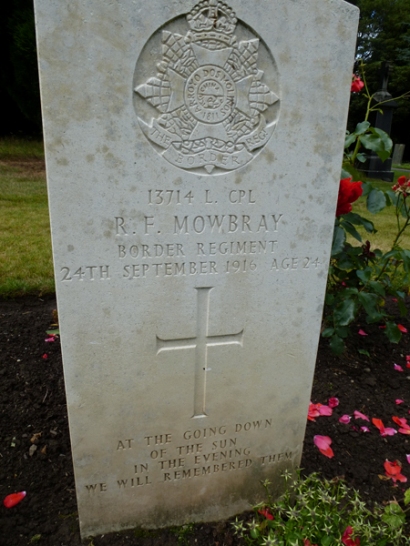
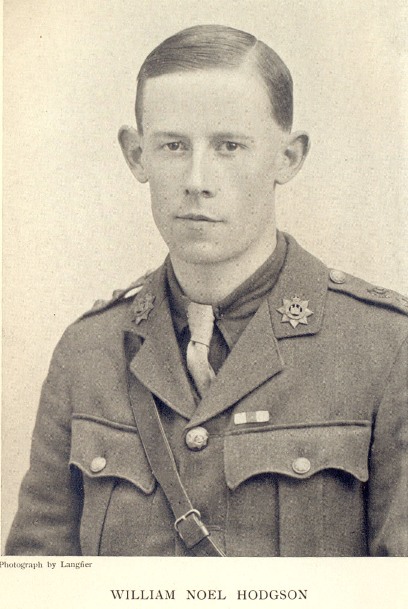
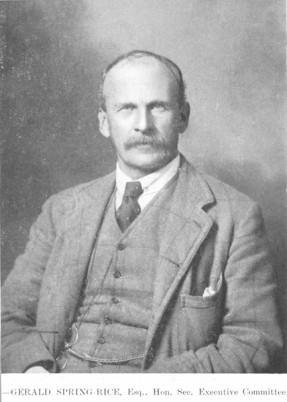
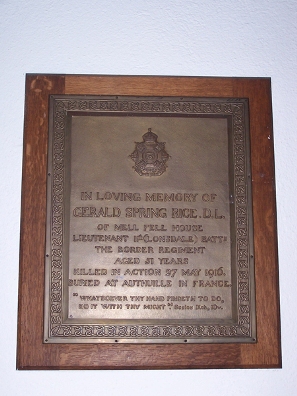
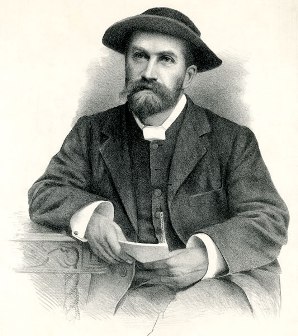
Laurence Binyon
One of the most striking features of the Great War is the enormous amount of poetry it inspired. Keith Robbins in his book The First World War, 1985, estimates that in August 1914 alone one and a half million war poems were written. That is 50,000 a day. The vast majority were of course privately written and of very varying standard. The historian Catherine Reilly has identified 2,225 published poets in Britain between 1914 and 1918. Of all these verses four lines of poetry by Laurence Binyon are stamped on the nation's consciousness.
Laurence Binyon was born in Lancaster in 1869. He was a man of many accomplishments and achievements. Yet for all his dozen volumes of poetry, professorships and scholarships he is best known for one poem and in particular one four lined verse, the fourth of seven. The poem is For the Fallen and the verse
They shall not grow old, as we that are left grow old:
Age shall not weary them, nor the years condemn;
At the going down of the sun and in the morning
We will remember them
These are the lines read at each Remembrance Day. They are the lines found on war memorials all over the English speaking world. Several lines from For the Fallen are carved by the entrance to the British Museum as a tribute to its staff who died in the Great War. Binyon worked there as Keeper of Prints and Drawings. You often come across his words on Commonwealth War Graves Commissions headstones; see opposite photo of the gravestone of Lance Corporal RF Mowbray of the Border Regiment who died on 24th September 1916 aged 24.
The poem was written in September 1914, before its publication in the Times on September 21 and probably after the First Battle of the Marne, 5-12th September. Binyon was 45 at the time and it is said he wrote the words sitting on a cliff at Polzeath, in Cornwall. He served as a Red Cross orderly in France for a short time in 1916. Binyon died in 1943.
William Noel Hodgson
On December 5th 1916 Mr Courtney Hodgson of 1 Devonshire Terrace, Stanwix, Carlisle, wrote to the Cumberland News 'You may possibly have seen that a small volume of verse and prose by my nephew WN Hodgson who fell at Loos has been brought out and I was thinking that you might review it in the 'News' as the work of a Cumberland man. The book is mostly reprints from the Spectator, Saturday Review, New Witness and tho' I may be prejudiced I have no hesitation in saying that some of the verses are real poetry'.
William Noel Hodgson, son of the Bishop of Ipswich, was born at the vicarage, Thornbury, near Bristol, Gloucestershire, on 3rd January 1893. Hodgson's family had ties with the north of England, specifically Durham and the Lake District. Both locations feature in much of his poetry.
He joined the 9th Devons in September 1914, and won the Military Cross for bravery at the Battle of Loos. Like many of his class and generation, Hodgson was an aspiring poet, but sadly only achieved any celebrity after his death at Mametz on 1st July.
The events of war seeped into Hodgson's writing and his poem 'Back to Rest', written soon after the Battle of Loos, highlights the harsh experience:
'Death whining down from Heaven,
Death roaring from the ground,
Death stinking in the nostril,
Death shrill in every sound…'
'Before Action' which was written on 29th June, 1916 is perhaps Hodgson's most famous poem. It was written during preparations to go into the Somme offensive. Composed like a prayer,the last line, 'Help me die, O Lord' is particularly striking as William Noel Hodgson died two days after producing the poem on 1st July 1916; the first day of the Somme offensive.
I, that on my eyes
A hundred of Thy sunsets spill
Their fresh and sanguine sacrifice,
Ere the sun swings his noonday sword
Must say good-bye to all of this: -
By all delights that I shall miss,
Help me to die, O Lord.
The body of Hodgson, along with many of his fellow officers and men, was brought back to a disused trench in Mansel Copse for burial. A wooden board erected on the site recorded the fact that "The Devonshires Held This Trench, The Devonshires Hold It Still". When the grave was made permanent by the War Graves Commission in the 1920s, into what is now Devonshire Cemetery, the board had long since disappeared. In 1986 a new memorial bearing this famous legend was unveiled by the Duke of Kent, President of the Commonwealth War Graves Commission and Colonel of the Devon and Dorset Regiment, on the seventieth anniversary of the action.
It can be found in stone by the entrance to the cemetery.
Sir Cecil Spring Rice and his poem of 'Two Kingdoms'
By Joseph Ritson
Sir Cecil Spring Rice was born at London in 1859 but largely due to a long term illness spent much of his childhood at the family home at Watermillock beside Ullswater (now the Old Church Hotel). After being educated at Eton and Balliol College, Oxford Cecil Spring Rice entered the British diplomatic service, culminating in his appointment as British Ambassador to the United States and based in Washington (1912 - 1918). It is believed that it was the memory of Ullswater and the English Lake District that inspired Cecil Spring Rice to write his most famous "Urbs Dei" ('The City of God'), sometimes referred to as 'The Two Kingdoms'. The first draft of this two verse poem was written in 1908 while he was based at the British Embassy in Sweden and completed in 1912 about the time of his appointment to Washington. Finally, at the end of 1917, Spring Ricwrote a completely revised first verse in light of an ever-growing number of British and Empire war casualties.
Written shortly before Britain's declaration of war against Germany in 1914, 'Urbs Dei' aptly summed up the feeling of an individual's loyalty, self- sacrifice and a love of 'two kingdoms'. The first verse is about the earthly kingdom (Britain) and the second verse is about the Kingdom of Heaven. In the original first verse of the poem a son hears his mother country (Britannia) calling him home and join with her other sons in a great battle. In the early days of the so-called 'Great War' many sons of the Empire and Commonwealth answered Britannia's call to arms. Among them was Gerald Spring Rice, Cecil's younger brother, who left Canada and returned to his Cumberland home after reading this poem. Gerald Spring Rice enlisted with the local 'Lonsdale' Battalion and was appointed as Transport Officer. He was killed in action in May 1916 at the age of 51.
Here is the original first verse of Cecil Spring Rice's poem 'Urbs Dei':
"I heard my country calling, away across the sea,
Across the waste of waters, she calls and calls to me.
Her sword is girded at her side, her helmet on her head,
And around her feet are lying the dying and the dead;
I hear the noise of battle, the thunder of her guns;
I haste to thee, my mother, a son among thy sons."
Early in 1918 Sir Cecil Spring Rice was recalled from his posting to Washington. While travelling home with his wife, Sir Cecil and Lady Spring Rice stopped over at Ottawa (Canada) to stay with the Governor-General, the Duke of Devonshire (Lady Spring Rice's cousin). Cecil Spring Rice did not see home again as he died suddenly at Ottawa on 14 February 1918. His final resting place is in Beechwood Cemetery, Ottawa. Cecil Spring Rice's revised poem, "I vow to Thee My Country" was therefore published posthumously. In 1921 it was set to music ("Thaxted") by the British composer Gustav Holst. It quickly became a favourite hymn at Remembrance services and also at many funerals and weddings.
Cecil and Gerald Spring Rice are commemorated by memorial tablets inside Watermillock Parish Church close to their Cumbrian family homes. Additionally, below Aira Force waterfall near Ullswater there is a memorial footbridge commemorating Cecil Spring Rice.
I vow to Thee My Country (by Sir Cecil Spring Rice):
"I vow to thee, my country, all earthly things above,
Entire and whole and perfect, the service of my love;
The love that asks no question, the love that stands the test,
That lays upon the altar the dearest and the best;
The love that never falters, the love that pays the price,
The love that makes undaunted the final sacrifice.
And there's another country, I've heard of long ago,
Most dear to them that love her, most great to them that know;
We may not count her armies, we may not see her King;
Her fortress is a faithful heart, her pride is suffering;
And soul by soul and silently her shining bounds increase,
And her ways are ways of gentleness, and all her paths are peace."
A wartime poetic tribute by Canon Rawnsley
By Joseph Ritson
Canon Hardwicke Drummond Rawnsley (1851 - 1920) was a well-known Church of England clergyman, an honorary dean of Carlisle Cathedral, a poet, writer of hymns, local politician, and conservationist. In the Lake District he is remembered as one of the earliest pioneers of the National Trust. For many years he served as vicar to the parish of Crosthwaite near Keswick
Canon Rawnsley was also a chaplain of the Border Regiment (Territorial Force) and in 1912 he was appointed chaplain to the king. In February 1915 it was announced that the King had graciously bestowed the Victoria Cross to two West Cumbrian men serving with the Border Regiment for rescuing two fellow soldiers on 21st December 1914. This news inspired Canon Rawnsley to write a poem in honour of these two soldiers, Abraham Acton V.C. of Whitehaven and James Smith V.C. of Workington, entitled "December 21st".
This is Canon Rawnsley's poem:
December 21st
When at Red Banks, companions tried and true,
You ventured all to save a brother man,
When with your precious burdens back you ran
And showed what gallant Borderers dare and do,
More than your soldier-mates took note of you,
The very angels who with your longing scan
This earthly stage were glad; your saviour-plan
Thrilled Heaven's great armies watching from the blue.
Wherefore today all Cumbrian hearts rejoice
To think the Viking warrior in your blood
Has learned of Christ the noblest knightliest thing;
To know you fearless made it the hero's choice,
And for your country's honour and your king
Have proved the deathless might of brotherhood.
In 1917 Canon Rawnsley retired from his post as vicar of Crosthwaite parish and spent his final years at Allan Bank, Grasmere - a former home of the poet William Wordsworth. He died in 1920 and was buried in the churchyard of his former parish at Crosthwaite.
Abraham Acton V.C. was killed in action in May 1915 and has no known grave. James Smith V.C. survived the war, moved to the Middlesbrough area where he passed away in May 1968.

